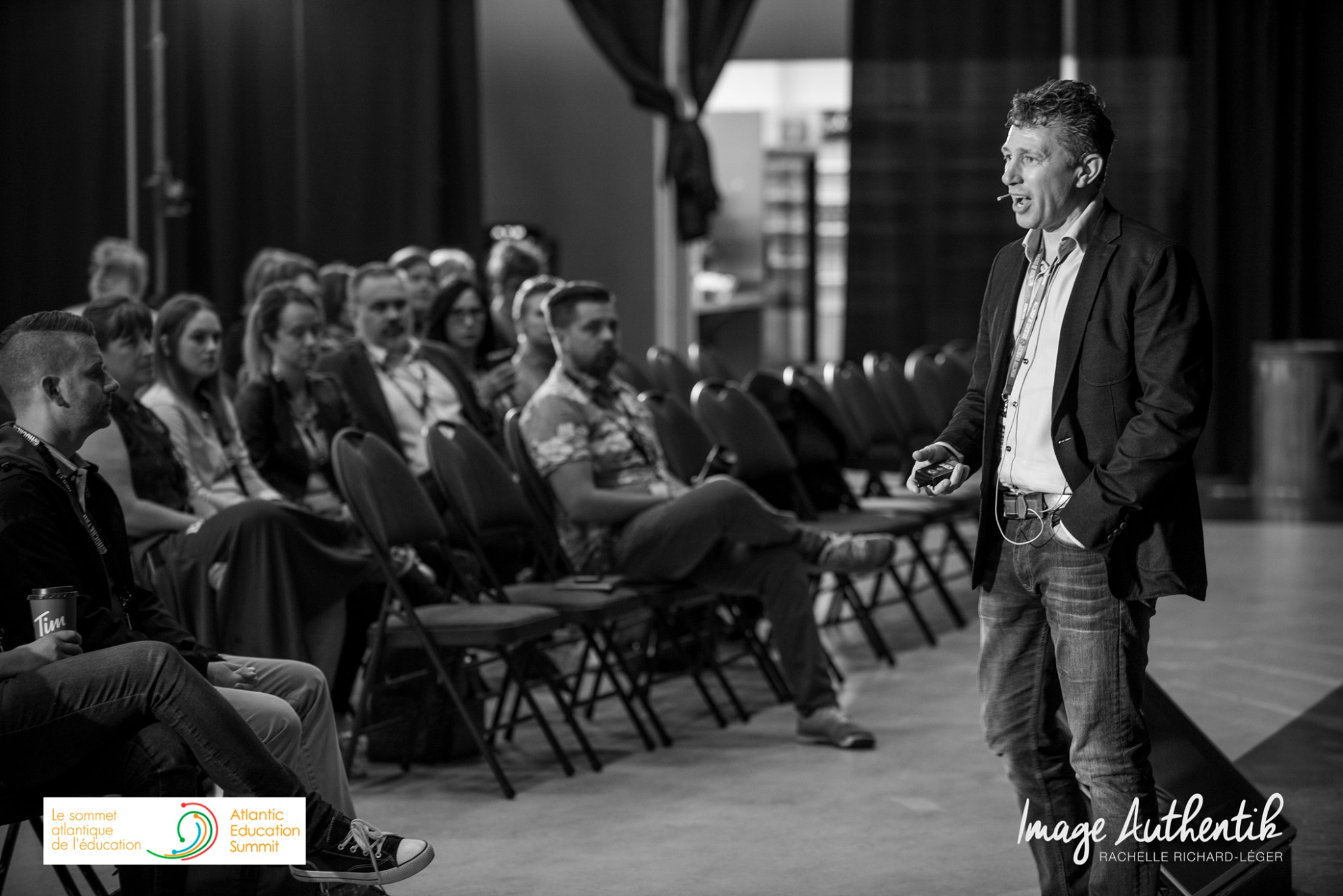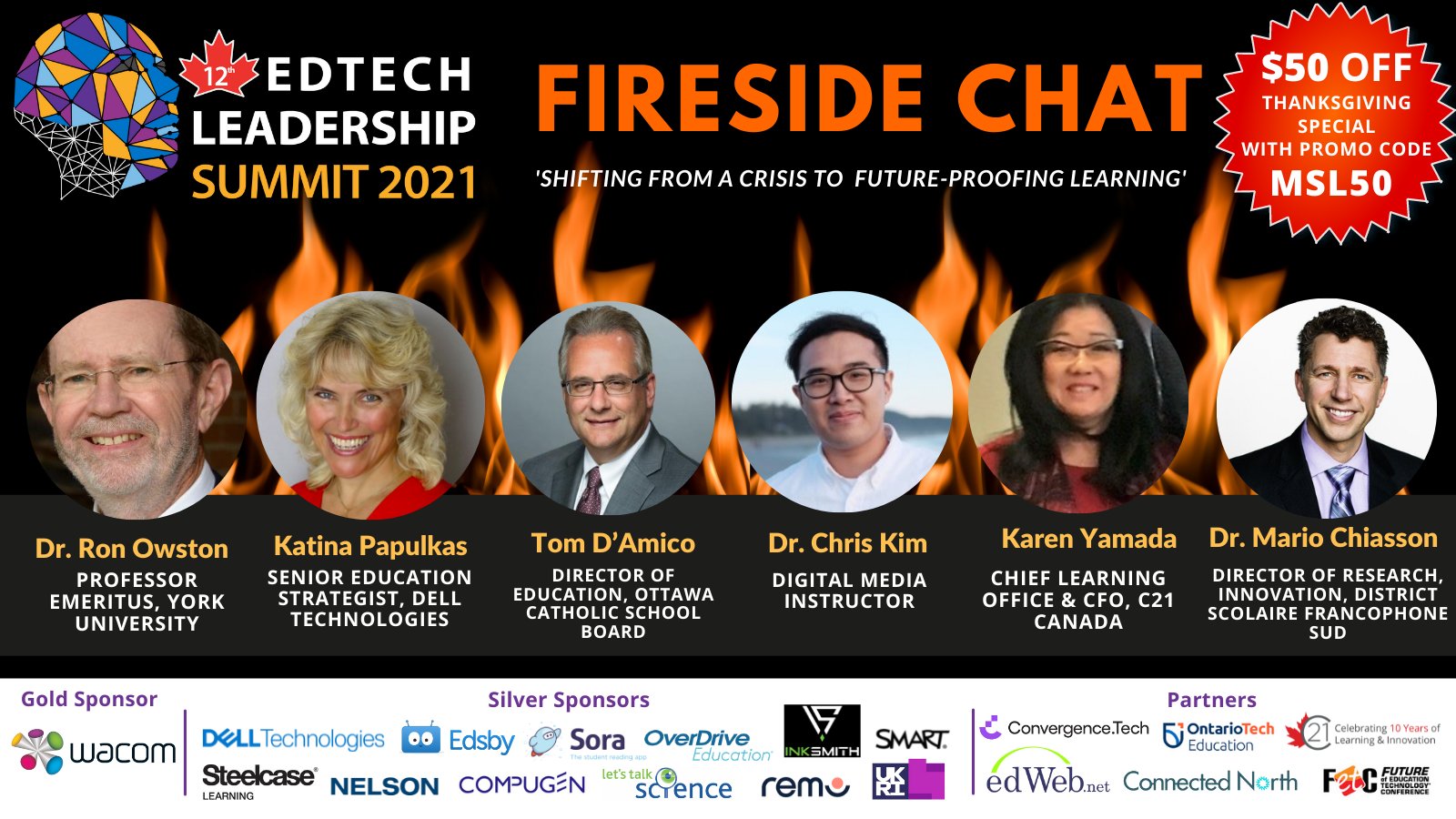
Mario is the most iconic fictional character in the global video game industry. At the height of his fame in the 1980s, he was the star of the Nintendo Super Mario series of games, capable of ‘powering-up’ to acquire greater abilities and surmount any obstacle in his path.
Today, the Canadian education world has, by strange coincidence, its own version of a video game super hero – Dr. Mario Chiasson, a super-charged technology evangelist with a title to match, Director of Research, Innovations and Change Management in New Brunswick’s Francophone South school district, based in Moncton.
At last week’s virtual Canadian EdTech Summit 2021, sponsored by Toronto-based Mind Share Learning, Chiasson dazzled the audience of educational leaders and ed-techies with his usual high energy presentation. “We are living in COVID times,’ he declared, “and it’s the era of VUCA.” Succeeding in it, he added, means “embracing the three A’s – agility, adjusting, and adapting.” “Everything is fast and deep and we need to be responsive to shifts in time, space, and technology.”
If you missed all that, you are not alone. Chiasson talks fast and speaks in fluent but nearly impenetrable ed-tech jargon. What is VUCA? It’s short for today’s “volatile, uncertain, complex and ambiguous” world driven by “the speed of technology” where the educational system is under pressure from a “digital environment” which is “collaborative and malleable” rather than ordered and set in its ways.
Putting innovation at the centre of education is his mission and that of his latest visionary ed-tech project, Intrappreueur, aimed at transforming schools with digital technology, artificial intelligence, interconnected robotics, and new forms of management. “Shifting the education culture from an Ego-System to an Eco-Community,” is how Chiasson describes it with his usual vivid metaphoric language.
While it sounds like a pipe dream, the project is already underway in six pilot high schools in Francophone South. “We’re out to implify rather than implement innovation,” he told me in a recent interview. Some four out of ten students, he claims, are disengaged and to reconnect with them will require “inclusive, personalized learning.” In his vision, “the class will be transformed into the ‘learning lab’ and the school becomes an innovative community learning centre.”
School leadership is a preoccupation of Chiasson and that may explain why he spends so much of his time ‘managing upwards’ in the K-12 system. Since the inception of C21 Canada, the high-tech advocacy group of education executives, he has emerged as a darling of Canada’s CEOs and is closely aligned with the leading ed-tech vendors, including Apple Education, CISCO, InkSmith, and Steelcase Education. To no one’s surprise, Mario was honoured as Innovator of the Year in 2020 by the country’s leading ed-tech promoter, Mind Share Learning.
Chiasson speaks a lot about what students need to thrive in the digital workplace and, more specifically, how to avoid being casualties of technological acceleration and automation. Today’s schools, he believes, need to set aside the old curricula and embrace the ‘recertification’ of students. “The labour force,” he contends, “needs to be recertified” because of workplace dislocations demanding a new set of skills. “Instead of developing workers, we need to develop young entrepreneurs or intrappreneurs.
Now entering his fifties, and after teaching for over 25 years, Chiasson has lost none of his zip and vitality. Born and raised near Tracadie-Sheila, N.B., he mastered coding at age 12 while wiling away the hours in the back of his father’s electrical supply store. He honed his competitive instincts in provincial-level tennis and earned his first degree in Physical Education at Universite de Moncton (2002) before teaching French Immersion and going on to secure a Masters’ degree in School Administration with a specialty in technology (2004). That Dr. honourific came in 2020 when Chiasson completed his Ed.D. at U de M under the guidance of Faculty of Education ICT professor Viktor Freiman.
Like most ed-tech champions, Chiasson strives to be cutting edge and exudes business savvy. His own consulting firm, My Device, My Space, My Learning Inc., has a website overflowing with the latest high-tech buzz words. “Personalized learning,” “project based-learning,” and “experiential learning” are among the most popular. “It’s all about personalized learning,” he told me. “School is part of the journey and it’s important to introduce teachers to digital language, tools and ways of personalizing their teaching.”
The New Brunswick intrappreneur high school redesign project now being piloted in Francophone South is explicitly designed to disrupt prevailing school culture. With the support of Superintendent Monique Boudreau and a business-education alliance, Chiasson is out to transform high schools with technology-driven ‘21st century learning’ philosophy, constructivist, student-centred pedagogy and the latest digital tools.
“Digital IT is the new sandbox of innovation,” he says with a flush of exhilaration. Five years ago, his research revealed a “mismatch of leadership” because senior administrators simply could not understand, or see the value of. digital tools. That is why changing school leadership outlook and attitudes is deemed to be critical. “We call it ‘Operation Leapfrog’,” he told me, because we’re moving from Leadership 2.0 to Leadership 4.0 embracing the Fourth Industrial Revolution.” When it is fully realized, learning spaces will be totally revolutionized. Instead of learning in a six-pack of regular classrooms, high school students may find themselves in large ‘open concept’ spaces looking more like an experimental learning lab with break-out rooms.
Chiasson’s futuristic vision pushes at the boundaries with some radical mutations. His Atlantic Institute of Education Summer Institute program July 26 to August 6, 2021, featured a keynote address British high-tech management guru Richard Kelly, the world’s leading proponent of “swarm leadership.” The core concept was initially conceived by Harvard University T.H. Chan School of Public Health researcher Leonard J. Marcus to explain the massive manhunt following the Boston Marathon bombings. Applying it to educational leadership, Kelly promotes “swarm leadership” inspired by “the ways ants, bees, and termites engage in collective work and decision making.”
Educational visionaries project a certainty that comes from knowing the answers. Change is the only real constant in the world of the ed-tech evangelist. While leading regional IT initiatives from 2000 to 2004, he saw, first hand, the rise and fall of over-hyped projects such as 1:1 laptops and BYOD (Bring Your Own Devices). “Every two years,” he says now, “there’s a new phase of innovation.” They didn’t work because “students were not performing” and there was “a gap between the vision and the actual adoption of technology.”
One of Chiasson’s close allies, Karen Yamada, Chief Learning Officer of C21 Canada and the CEO Academy, cut through the tech-ed bafflegab at last week’s Canadian EdTech Summit. “We were rolling the rock uphill, then COVID-19 hit. It presented us with an opportunity to shake it up,” she said. “People, at all levels, focused on technology for the first time. It breathed new life into moving forward with the OECD Compass for 2030, embracing technology enhanced global competencies.”

New Brunswick’s “Super Mario” of digital innovation is an eternal optimist. Like most true believers, Chiasson remains undeterred by old fossils, skeptics, or the wreckage of jettisoned initiatives. “I’m a positivist and aspirational by nature,” he confessed. Confronted by skeptics or nay-sayers, he powers-up and remains steadfast. “I take the time to explain it, so they can understand it better.” There is, after all, no turning back.
* Adapted from The Telegraph Journal, Brunswick News, November 5, 2021.
What motivates ed-tech evangelists like New Brunswick’s Dr. Mario Chiasson? What role does C21 Canada and the C21 CEO Academy play in seeding “21st century learning” in provincial school systems? How much faith should we place in technology as a source of innovative thinking and the route to educational transformation? To what extent does the ed-tech industry blur the distinctions between private interests and the public good? Do education technology designers promote innovations based upon forecasts of the “next big thing” or sound educational practice?